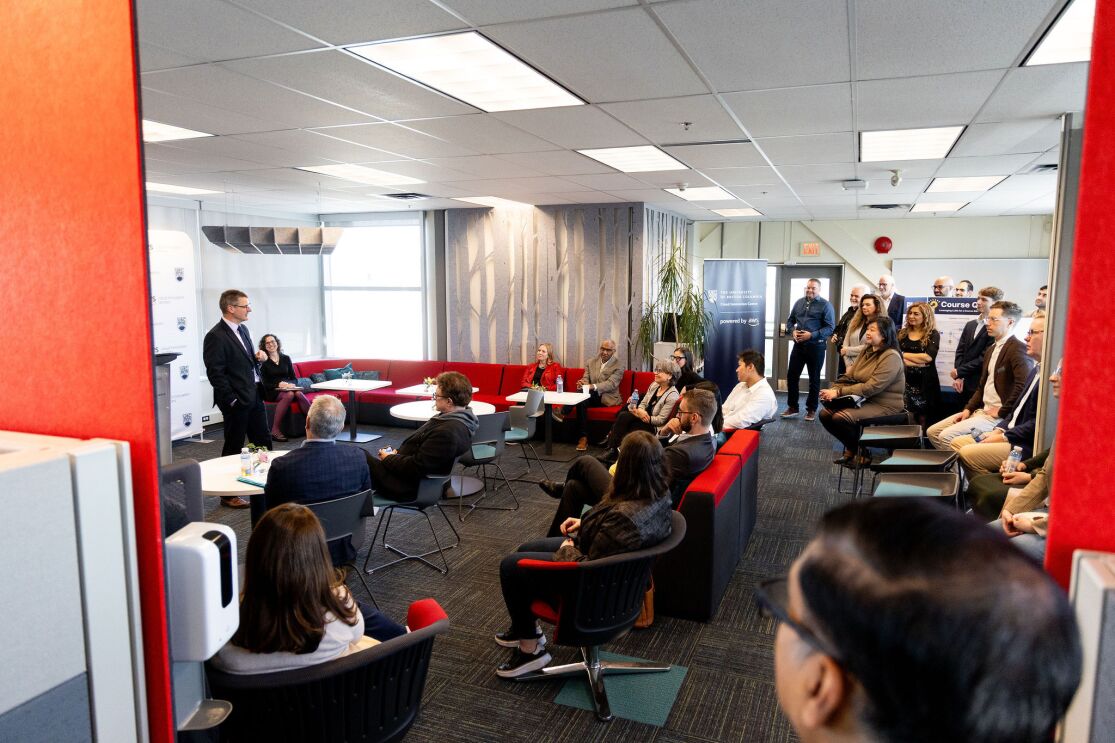Technology is advancing at lightning speed, and innovations like generative artificial intelligence (generative AI) are transforming how organizations operate. Ensuring public institutions, in areas such as education, healthcare and the non-profit sector, have easy access to these advanced technologies is essential to keeping pace with the ever-changing needs of the communities they serve.
That’s why the University of British Columbia’s Cloud Innovation Centre (UBC CIC), powered by Amazon Web Services (AWS), is now focusing on generative AI to ensure organizations can adopt this groundbreaking technology to drive innovation and improve the services they offer. The UBC CIC program is embracing this technology to ensure that students are learning these critical skills to power the future.
Initially launched in collaboration with AWS in 2020, UBC CIC was established as a hub where students, staff, faculty or organizations could bring forth real-world challenges and discover at no cost if cloud technology can help find a novel solution. UBC co-op students and graduate research assistants work alongside UBC professional staff and AWS technical experts using Amazon’s innovation process and AWS cloud services to create viable prototypes.
“UBC has long been at the forefront of using new and emerging technology to support learning and student success,” said Gage Averill, Provost and Vice-President, Academic at UBC. “The CIC is a wonderful example of that innovation, providing transformative learning experiences for students to generate impactful solutions to pressing community challenges. In addition, the current focus on AI is timely and critical for how we prepare our students to be confident and fluent in the use of these tools in ethical and productive ways.”
To date, the UBC CIC has completed more than 50 challenges focused on community, health and wellbeing, tackling problems such as reducing MRI wait times, identifying invasive plant species, and identifying hundreds of unknown RNA viruses. As part of the program’s ongoing commitment, the solutions created remain open-source, ensuring all have access to shareable, reusable, and sustainable technologies that benefit others.
“The province of British Columbia is committed to supporting science and research conducted in university as a catalyst for economic development and social progress,” said Brenda Bailey, Minister of Jobs, Economic Development and Innovation. “Here at the UBC Cloud Innovation Centre, students and staff learn as they collaborate and work through real-world challenges, demonstrating the art of the possible., which will foster a strong economic future driven by innovation that will ensure that British Columbia remains North American’s top tech hub.”

Using Generative AI to tackle challenges that matter most
“AI is already driving societal impact globally,” said Coral Kennett, AWS Canada Education Lead. “It assists medical professionals in analyzing patient data, helps educators review curricula and education materials to produce better exam questions, and helping communities prevent and protect against wildfires. While we’re just seeing the tip of the iceberg today, generative AI is becoming one of the most transformative technologies of our lives. We’re excited to work with the UBC CIC to create solutions that will solve every day problems and enhance people’s lives.”
The UBC CIC is one of more than a dozen AWS Cloud Innovation Centres around the globe, breaking down barriers to access technology for a healthier and more sustainable world. AWS created the Cloud Innovation Centre program as part of its mission to democratize technology, ensuring all organizations, no matter their size or scope, have access to the same cloud technology as the world’s largest enterprises. This focus on building shareable, repeatable and sustainable generative AI solutions aims to bring value far beyond the organizations working directly with the CIC.
The UBC CIC has already used Machine Learning, AI and generative AI to innovate and create viable prototypes to help solve many every day challenges. Here are a few examples:
- · Vancouver Coastal Health MRI Project “CAN’T WAIT” — The UBC CIC worked with Vancouver Coastal Health to create a tool that could help reduce MRI wait times. Together they created a Machine Learning prototype to review more than 10,000 MRI requisition forms a month and help radiologists determine priority for screening. In order to better manage wait times, the prototype helps recommend which MRI centre patients should be assigned.
- Student Advising Assistant — UBC’s Faculty of Science Advising Office collaborated with the CIC to leverage large-language models (LLMs) and generative AI to build a prototype aimed at improving the advising quality and student experience. The prototype takes information from the Academic Calendar and other reliable UBC sources to provide an around-the-clock service that responds to inquiries.
· Virtual Assistant Tool: E-Comm Connect: The CIC worked with E-Comm 9-1-1 to create a prototype that shows how a virtual assistant could help police call takers when answering non-emergency calls. The tool could benefit call takers by providing recommendations on which Standard Operating Procedure (SOP) they should reference, to help them quickly find the relevant SOP for the police agency of jurisdiction.

Embracing Generative AI
By combining UBC and AWS’s expertise, and offering project sponsors the ability to choose the right model for the right job, the CIC will allow organizations of all sizes to explore the vast potential of generative AI to tackle complex challenges, enhance services, and drive meaningful change. From enabling faster medical diagnoses, improving patient care, developing more efficient and sustainable farming practices, or helping with flood protection, the possibilities with generative AI are endless.












